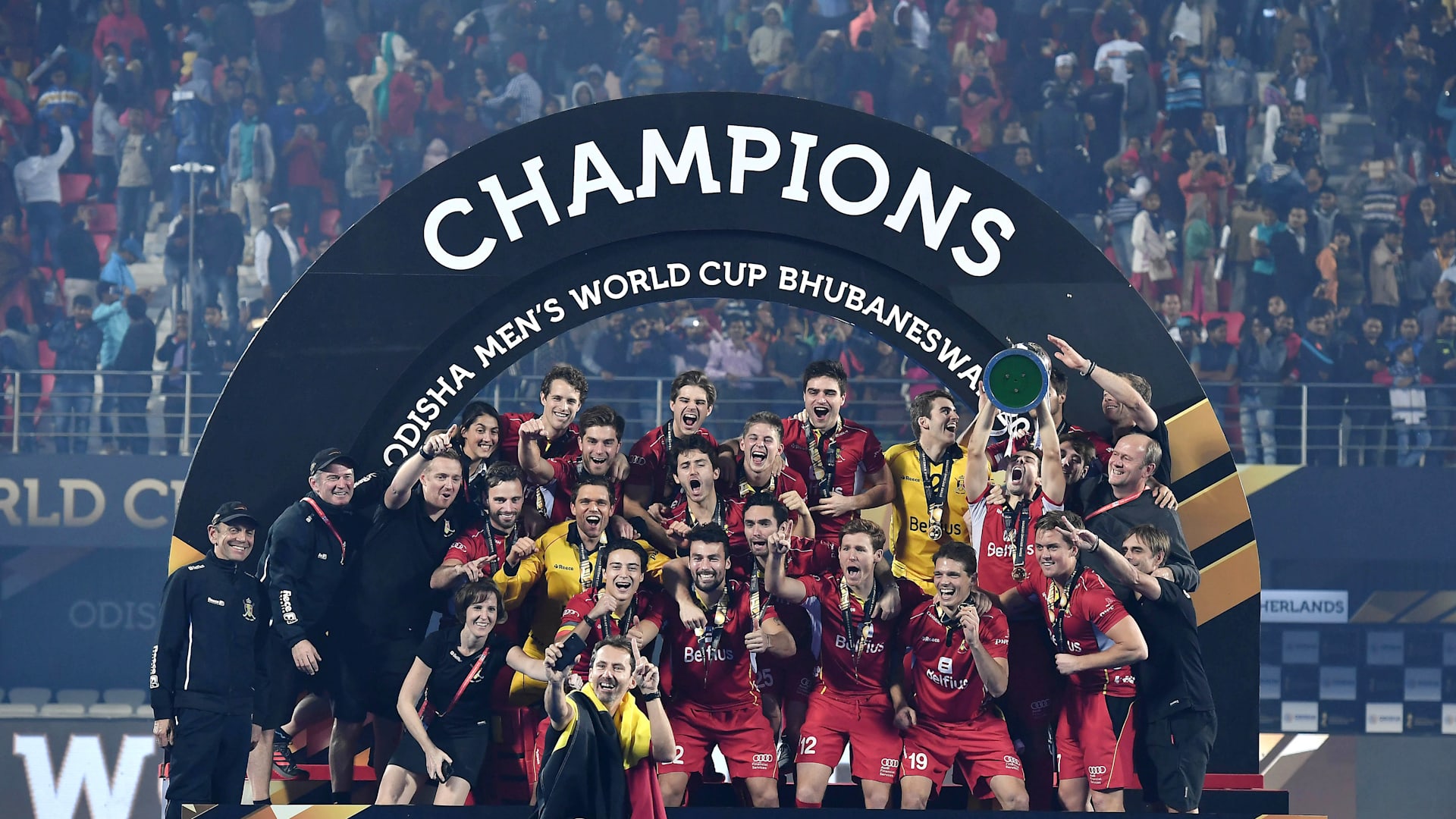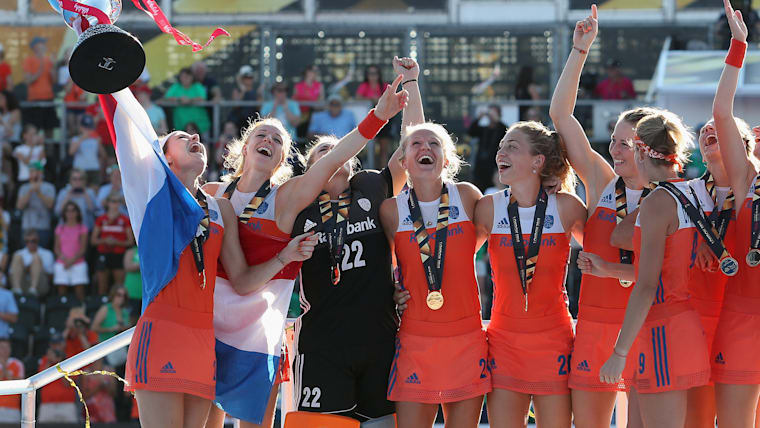News for 20 December 2020
All the news for Sunday 20 December 2020
Hockey World Cup: Roll of honour and everything else you wanted to know
Started as an attempt to expand the game beyond the Olympic Games, the men’s and women’s World Cups, organised by the FIH, are blue riband events.
By Rahul Venka
For much of the previous century, the rich heritage of hockey was tied to the Olympic Games.
Every four years, the best teams in the world gathered to play for the Olympic gold, considered the highest honour in hockey. It was dominated by the Asian teams, with India alone winning eight gold medals and Pakistan three.
The Asian stranglehold began waning in the 1970s as the world moved away from natural grass fields and towards astroturfs – artificial grass surfaces specifically designed to play hockey. The change in surface saw a change in guard as the faster and fitter European nations began to compete a lot better.
Field hockey was expanding its reach and it received a solid boost when the first edition of the men’s Hockey World Cup was staged in 1971.
The idea of a hockey World Cup was first mooted jointly by India and Pakistan in an International Hockey Federation (FIH) council meeting in March 1969.
Pakistan, represented by the Pakistan Hockey Federation chief Air Marshal Nur Khan – a sports enthusiast who also served as Pakistan’s head of federation for cricket and squash – proposed that the first Hockey World Cup be held in Pakistan. (Nur Khan was also the brainchild behind the concept of the Hockey Champions Trophy.)
However, a politically charged climate in the Indian subcontinent meant that Spain was chosen to host the inaugural Hockey World Cup.
The Hockey World Cup trophy, standing at 61cm tall, was designed by artisans in the Pakistan Army, who made it out of gold and silver.
The stage was set for a brand new world tournament in field hockey.
Men’s Hockey World Cup
The first men’s Hockey World Cup was an experiment and it was quite a success. The tournament attracted almost 10,000 people, emphasising that the sport was growing beyond its Asian echelons. Pakistan won the first FIH Hockey World Cup, beating hosts Spain 1-0 in the final.
Pakistan are also the most successful nation in the men’s Hockey World Cup, winning four titles. The Netherlands and Australia follow close behind with three World Cups each. The Netherlands was also the first country to win the World Cup as hosts in 1973.
Germany is the only other country with multiple World Cup titles with two. India and Belgium have won one World Cup each. Belgium are the defending champion, having won the World Cup in 2018.
India at men’s Hockey World Cup
The Indian hockey men’s team may be the most decorated side in the history of the Olympics, but its record in the World Cup hasn’t been as glorious.
India won the World Cup in 1975 beating Pakistan 2-1 in the final with Ashok Kumar, the son of wizard Dhyan Chand, scoring the winning goal.
The team was managed by the legendary Balbir Singh Sr. and led by Ajitpal Singh.
India, of course, had reached the final in 1973 but lost to the Netherlands and finished third. Since 1975 though, the Indian hockey team has not managed to make the semi-finals.
The Indian men’s hockey team will be looking for a podium finish when it hosts the 2023 FIH Men’s Hockey World Cup. This will be the second-consecutive World Cup to be held in India after 2018.
Men’s Hockey World Cup winners list
1971 - Pakistan
1973 - The Netherlands
1975 - India
1978 - Pakistan
1982 -Pakistan
1986 - Australia
1990 - The Netherlands
1994 - Pakistan
1998 - The Netherlands
2002 - Germany
2006 - Germany
2010 - Australia
2014 - Australia
2018 - Belgium
Women’s Hockey World Cup
The first edition of the Women’s Hockey World Cup was held in 1974, three years after the first men’s World Cup. The Netherlands became the inaugural champions after they beat Argentina 1-0 in the final.
The Dutchwomen have dominated the World Cup, winning eight titles in total, including a hat-trick in 1983, 1986, and 1990, making them the most successful team in the history of the competition.
The Netherlands have also won the previous two World Cups in 2014 and 2018 and will be gunning for a second World Cup hat-trick at the next edition in 2022 in their home country.
The Netherlands have won the women’s Hockey World Cup eight times.
Three teams are tied for second place behind the Netherlands. Argentina, Australia, and Germany have each won two World Cup titles. In 1976, the Germans (as West Germany) were the first to win a women’s World Cup as hosts.
India at women’s World Cup
The Indian hockey women’s team began well at the Hockey World Cup in the inaugural edition in 1974 as it topped Pool A, which included eventual winners the Netherlands.
However, the Indian hockey women’s team fell to Argentina 1-0 in the semi-finals and then lost the third-place playoff 2-0 to West Germany to end fourth.
That remains India’s best-ever finish in the competition as they have been unable to make the semi-finals since.
However, the Indian hockey women’s team now has the potential to do better in upcoming World Cups. Having qualified for two consecutive Olympic Games (Rio and Japan), Indian women will fancy their chances in the 2022 edition in the Netherlands.
Women’s Hockey World Cup winners list
1974 - The Netherlands
1976 - West Germany
1978 - The Netherlands
1981 - West Germany
1983 - The Netherlands
1986 - The Netherlands
1990 - The Netherlands
1994 - Australia
1998 - Australia
2002 - Argentina
2006 - The Netherlands
2010 - Argentina
2014 - The Netherlands
2018 - The Netherlands
Junior Hockey World Cup
While the senior men’s and women’s World Cups are the main draw, FIH also holds a Junior World Cup.
The rules state that only players below the age of 21 on the December before a Junior Hockey World Cup year are eligible to play at the event.
The first FIH Junior Hockey World Cup for men was held in 1979. Pakistan won the inaugural edition. It remains Pakistan’s only Junior World Cup title to date.
Germany have a solid record in the men’s Junior Hockey World Cup, winning a record six titles, including four consecutive ones in 1982, 1985, 1989 and 1993.
India are the second-most successful nation in the men’s Junior Hockey World Cup, having won two titles (in 2001 and 2016). India, the defending champions, have made the semi-finals on two other occasions.
The first women’s Junior Hockey World Cup was held in 1989, with West Germany winning their only title that year.
The Netherlands are the most successful team in the junior women’s tournament, winning three titles, followed by Argentina and South Korea, who have won two each.
The next edition of both the men’s and women’s Junior World Cups will be held in 2021. The men’s edition will be held in India while the women will play in South Africa.
Olympic Channel
December 19 is a red letter day in the Indian hockey history
December 19. There is some magic to the date. On this day India won two of its three Asian Games gold. There is another coincidence. Both success at the Asian summit came in the same city, Bangkok – Editor.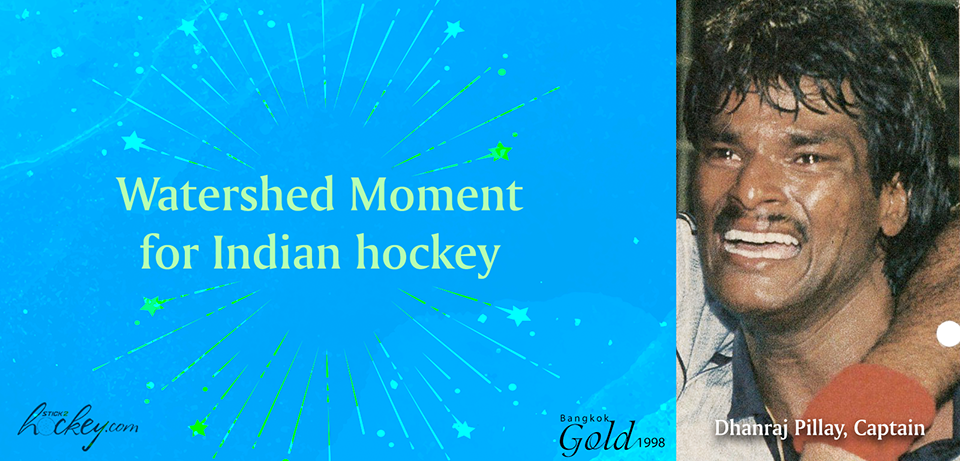
DECEMBER 19, 1966: India was defending champions when hockey was introduced at its third edition (1958). Naval Tata, the benevolent chief of the Indian Hockey Federation, had just moved to head the newly formed All India Sports Council. Ashwini Kumar, a boxer in his school days, succeeded him. His team of new officer bearers announced the team for the 1958 Asian Games with Balbir Singh Sr. as captain. It did not go well with KD Singh Babu, who led India to gold at Helsinki Olympics four years ago. He refused to attend the camp. VJ Peter, who would carve a niche for himself filled in the shoes. However, India lost the Asian title to Pakistan. Their match was drawn but Pakistan was declared winner as it had better goal average. India was Olympic champions but not the Asian Champions.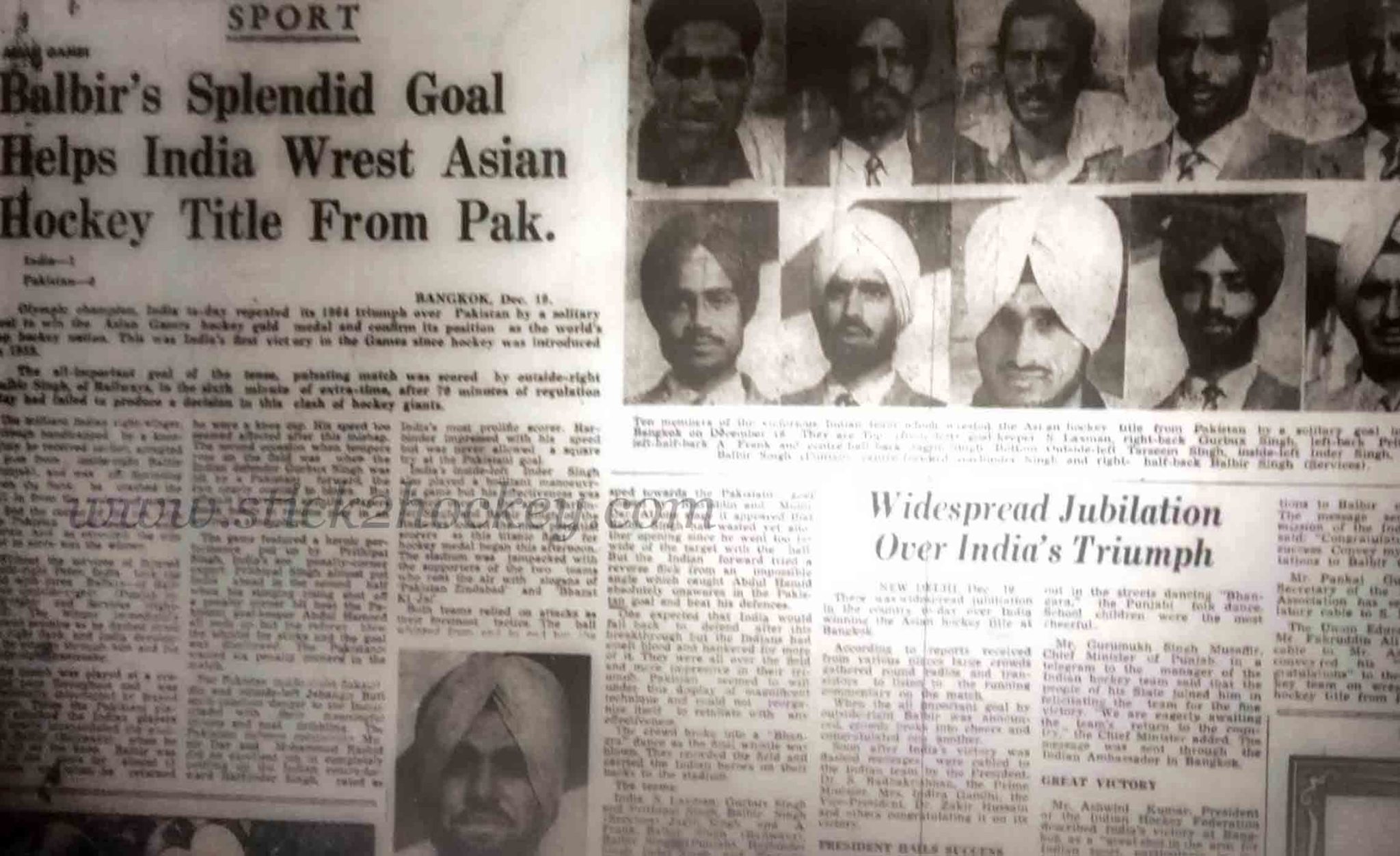
Media coverage of India’s success at the 1966 Asian Games Photo: K Arumugam collection
1960 Olympics rectified it (India 0 Pakistan 1 in the Rome final) . The 1962 Asian Games again proved Pakistan’s supremacy. Once the Tokyo Olympic helped India to regain its champion status, Bangkok Asian Games that followed two years later accentuated it. Shankar Laxman’s India beat Pakistan in the final 1-0, thanks to the lone goal by mesmerising Balbir Singh Grewal, known as Railways’ Balbir.
Then came the long tragedy for India.
DECEMBER 19, 1998: It took India 32 years to regain the Asian supremacy. This time at Bangkok there was no Pakistan in the final. They lost to emerging South Korea in the semis. The Koreans had been a force since they hosted the 1986 Asian Games and 1988 Olympics. They were rated above India in every respect. The SK-India final was a tense affair. It was India’s eighth Asian Games final and for the Koreans’ the third. Korea took the lead only to be equalized 22 minutes later by the Indian captain Dhanraj Pillay. The regulation time of 70 minutes ended at that score. The extra-time of 15 minutes too did not bring any goals. Therefore, the tie-breaker rule was applied to find the winner. Here, Indian goalie Ashish Ballal emerged success. He blocked two attempts of Koreans. For India, Md Riaz, Baljit Dhillon, Ramandee Singh and Mukesh Kumar scored in that order get us the title.
Year 1998 was otherwise a disappointing year. India failed to get any medal at the Commonwealth Games, losing the semifinal to the hosts Malaysia and then flopping at the Utrecht World Cup too. Therefore the Bangkok success turned the table. The players were ecstatic. India was euphoric.
Lets now see what those 16 achievers do nowadays
The 1998 Asian Games team and their whereabout
Chief coach: MK Kaushik: When he was the chief coach of the epoch making team, he was with the Tata Oil Mills, posted in Mumbai. Later, he joined Haryana Sports Department, posted at Gurgaon, Delhi’s suburb. He is retired, worked with MP Hockey Academy before moving to current post at National Hockey Academy, Major Dhyan Chand National Stadium, New Delhi. After 1998 success, he led India women to Commonwealth Games silver, bronze at Asian Games and gold at Asia Cup. He was awarded both Arjuna and Dronocharya after the 1998 success.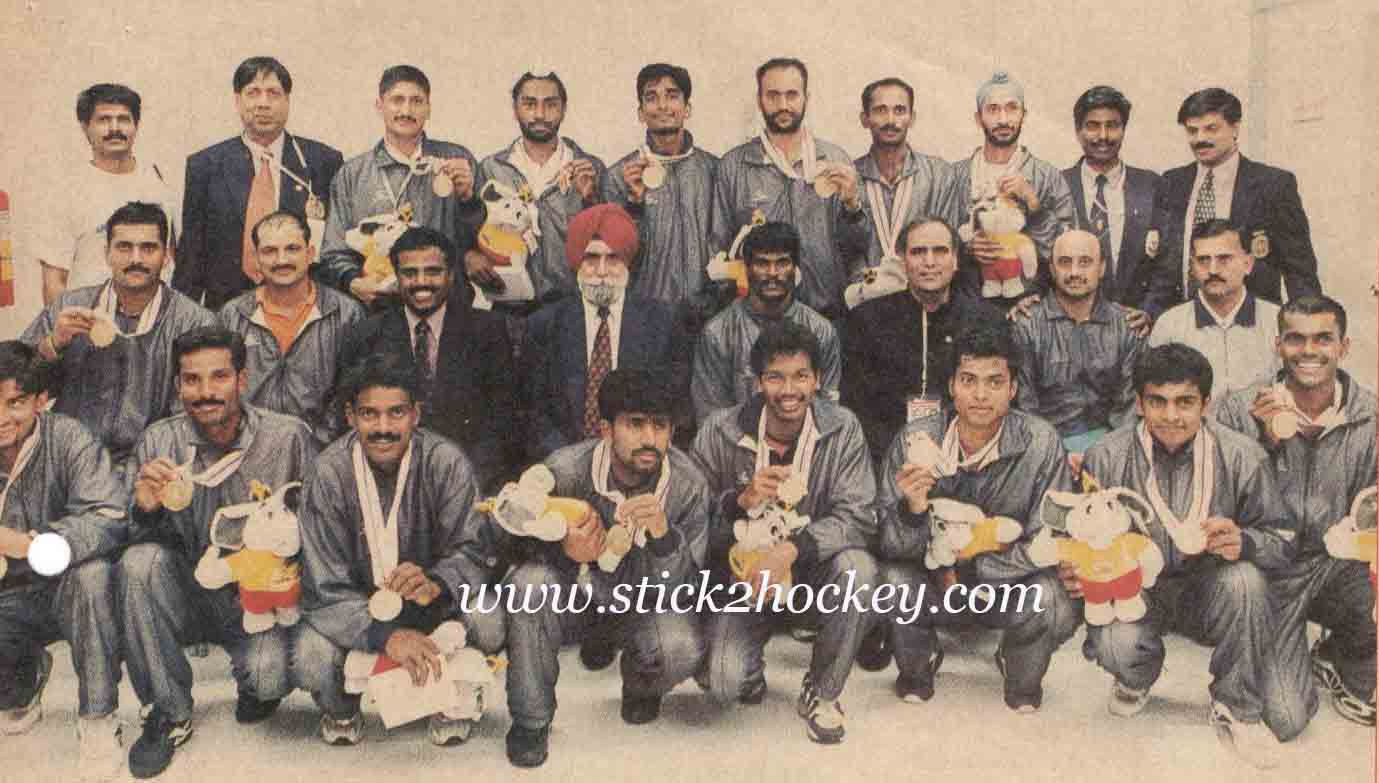
1998 Asian Games team with officials. Standing (l-r): CR Kumar, Suresh Sharma (IHF), AB Subbaiah, Baljit Dhillon, Ramandeep Singh, Baljeet Singh Saini, Krishnamurthy (umpire), Tata Co’s promoter. Sitting: Ashish Ballal, MR Negi, K Jothikumaran, KPS Gill, Dhanraj Pillay, MS Mallik (manager), M Kaushik, Dr. Ahuja. Sitting: Sandeep Somesh, Md. Riaz, Tirumalvalavan, Laxman Prabhakaran, Lajrus Barla, Dilip Tirkey, Sabu Varkey and Anil Aldrin.
Anil Aldrin, the defender continue to work in Airlines sector. After 1998, he was elevated to leadership for the 1999 India-Pakistan Series.
Ashish Ballal:His stardom revolves around the tie-break feat at Bangkok. He was one of the six players dropped after 1998 Asian Games. He continues to serve in the Airlines sector, residing in Bangalore. Was coach with the men’s national team for a brief period.
Lajrus Barla: The talented defender continues to work with Airlines, residing in Bhubaneswar.
Sameer Dad: Continues to work in the Airlines sector, posted at Bhopal. Did commentary for the Hockey India League.
Baljit Singh Dhillon: Was promoted in the Punjab Police department where he continues to serve. He played international hockey six years after 1998, promoted as captain. India won PM Gold Cup and First Champions Challenge and Asia Cup under his leadership.
Mukesh Kumar,: The right winger par excellence continues to work in the Air Lines sectors, posted at Hyderabad. He won both Arjuna and Padamshree. He married Nidhi, playing for India in the Asian Games. Nidhi won Silver as part of women’s hockey team in1998.
Captain Dhanraj Pillay: The famous star of India went on to win Khel Rata beside Arjuna and Padamshree awards. He had to quit Mahindra Company where he was working when he led the Indian team to gold at Bangkok. Joined Airlines sector. Played WSH and PHL, before becoming manager for the Sultan Azlan Shah Cup and Asia Cup etc. He played two more Olympics (over all 4) after 1998 Asiad.
Lakshman Prabhakaran: He was with the Indian Bank hockey team. however, the tragedy struck the southern star and expired. The centre-forward is the only member from the Bangkok squad who is not alive.
Mohammed Riaz: Famous midfielder turned inside forward continues to work with the Air India. He lives in Chennai.
Baljit Singh Saini: The right-half turned to coaching. He was coach for Indian men at the Delhi Junior World Cup. Then he moved to women’s, and trained them for the Buenos Aires Youth Olympics etc. He has moved to the States this year. He played for India another six years after 1998.
Ramandeep Singh: The left-half went on to lead India at the 2000 Sydney Olympics, He joined the Punjab Police post 1998 before settling in Canada.
Sandeep Somesh: The famous centre-half continues to work with petroleum sector. He lives in Bangalore, and often organizes tournaments.
A.B. Subbaiah: His hockey career almost came to an end with the gold. He took up coaching with women for some time before moving to hockey administration. He is presently secretary of the newly formed Hockey Karnataka, a State Unit under Hockey India with voting rights.
Dilip Tirkey: He emerged as the world’s first hockey player to cap 400 caps, led India to victories in many tournaments including the Afro-Asian Games, led India at all genre of competitions like World Cup, Olympics, Asian Games etc. Post hockey retirement, resigned from Indian Airlines to become Member of Parliament. He contested Parliamentary elections twice. He also headed Odisha State’s Tourism Department. Presently, he is chairman of Hockey Development council of Odishia.
Thirumalvalavan: The centre-half continues to work with the Indian Bank, lives in Chennai
Sabu Varkey: The famous inside-forward played for his Petroleum team for another decade. He is now settled in Bangalore.
Note: India won its only the third and last of the Asian Games at Incheon (South Korea) beating Pakistan in tie-breaker in the final.
Stick2Hockey.com
Megat steps out of Wallace's shadow
By Jugjet Singh
KUALA LUMPUR: After playing second fiddle to Malaysian Juniors coach Wallace Tan, former national player Megat Azrafiq finally gets his big break with Universiti Kuala Lumpur (UniKL).
He will handle the treble winners of the Malaysia Hockey League (MHL) from Jan 14-Feb 20.
Megat, who made his playing debut at the 2005 Rotterdam Junior World Cup, has the distinction of assisting Wallace to Malaysia's first Youth Olympics Hockey 5s gold in Buenos Aires in 2018.
And Megat will be filling the big shoes left in UniKL by national coach Arul Selvaraj.
"I have always been assistant coach but I will get my big break against UniKL in January. I have mixed feelings about the task.
"However, I am not worried because 70 per cent of last season's players are still with us.
"Even though we will not field any foreign players next year, UniKL still have the players to defend their titles," said Megat.
With the Charity Shield, League Champions and TNB Cup holders now under his wings, what does he expect from his players?
"Since the other seven teams are also not expected to field foreign players because of Covid-19 restrictions, it will be an all local-cast tournament. So I expect my players to rise above the opponents whom they know in and out," said Megat.
The three national players who will form UniKL's backbone are Razie Rahim in defence as well as penalty corners, Marhan Jalil in midfield and Tengku Ahmad Tajuddin in attack.
Megat, who has been assisting Wallace with the National Juniors, knows the national seniors like the back of his hands.
"I do know all the national juniors and seniors on a first name basis, and it will help me better plan against them. It's not going to be easy, but I am ready for this new challenge," added Megat.
UniKL's main opposition will come from Terengganu Hockey Team (THT) as well as Tenaga Nasional, who have also sourced for some of the best players in the country.
New Straits Times
Update following introduction of Tier 4 restrictions in parts of England
University of Nottingham vs Tower Hamlets
England Hockey is working to consider the full implications of the new Tier 4 restrictions in parts of the country.
Tier 4 is effectively a ‘stay at home’ requirement with only certain activities allowed. Most notably travel is significantly restricted as set out in the government guidance that states: ‘if you need to travel you should stay local - meaning avoiding travelling outside of your village, town or the part of a city where you live - and look to reduce the number of journeys you make overall.'
At 8pm on the evening of Saturday 19 December, the full detailed government regulations have not been published, therefore the key points for us to communicate for hockey at this time are as follows:
- Adult hockey is not permitted in Tier 4 areas
- Both under 18 and disability hockey are permitted, however:
- - Travel must be kept to being as local as reasonably possible.
- - Travel in or out of Tier 4 to play sport is not currently explicitly referenced in the government guidance as being permitted, therefore at this stage it is not recommended by England Hockey.
- - The restrictions in Tier 4 are such that we do not recommend fixtures taking place between clubs. The only scenario in which fixtures could take place is if the clubs and all participants are extremely local; ie within the village, town or part of a city where you live.
- Travel for work is allowed for paid coaches
Whilst there is an exemption for juniors to play, England Hockey recognises that the volunteers and coaches that make hockey happen have to feel comfortable continuing to provide activity. England Hockey fully supports clubs making decisions on a case-by-case basis about whether to continue in the short term.
We will continue to fully digest the implications of Tier 4 restrictions and will communicate more in the coming days. We will also update our FAQs.
We will hold a virtual forum for clubs on Monday 21 December from 16:30 – 17:30 for any clubs who wish to attend. We are asking for a maximum of 2 people per club so that every affected club has the opportunity to join if they wish. If you would like to sign up to the forum on behalf of your club, please complete the form by clicking here - ideally by midday on Monday. We will send a meeting link out to all who sign up on Monday afternoon ahead of the meeting, if you do not receive the email please check your spam folder prior to contacting us.
England Hockey Board Media release
